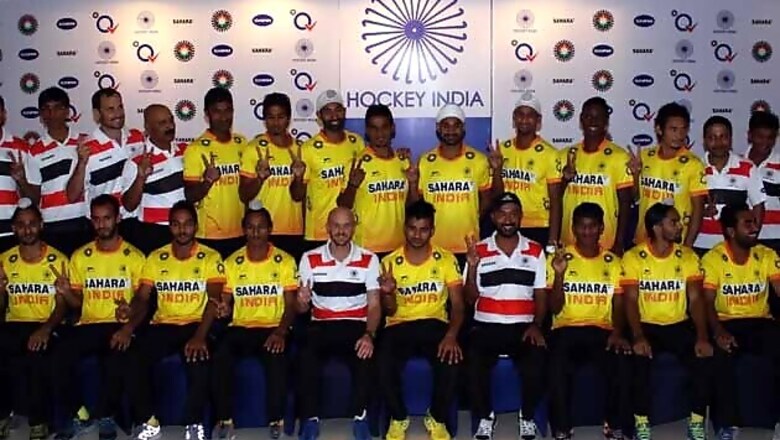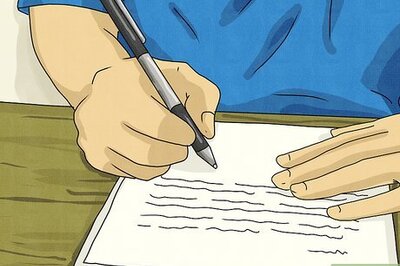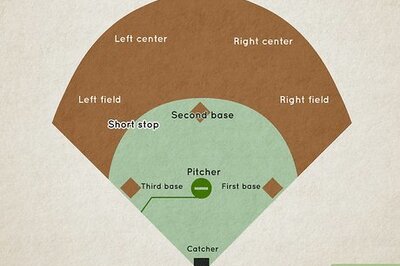
views
Back in July-August this year, a smile flashed across the face of Indian hockey lovers. The unexpected nature of the reason added extra glitter to the grin. The junior women team had won a world cup bronze and added conviction to the hope that boys will do better or at least repeat it four months later at home. And now we stand at the doorstep of that hope: the FIH Junior Men's World Cup.
The sticks are well oiled, the limbs loose and a fair degree of expectation is in the air around Major Dhyan Chand Stadium in Delhi, where the echo of sticks clattering during practice games will get lost in shrieks of home crowd when India take field against the Netherlands in their campaign-opener on Friday.
But it won't be easy - for there will be 15 other teams, and among those visitors will be archrivals, European powerhouses and Oceania juggernauts flexing muscle on Indian soil. Surely, it's a big ask, not just for India but for any other team that reaches the podium - 1, 2 or 3 - on December 15.
None of the bios is as impressive as the No. 1 Germans - the five time junior world champions. In nine editions of the tournament, just once have they missed out on the podium. The Netherlands, England, Belgium and France are the other guests from Europe. The French are still ranked as one of the upcoming hockey nations. Same was said about Belgium until two years ago, but not anymore.
The Belgians have made rapid strides in world hockey and it will be foolish to weigh them against their modest past results. The team is the reigning junior European champion, which testifies their rapid progress in world hockey.
The Dutch, pooled with India, may have never won the tournament, but it's a gifted nation with rich tradition of hockey that has always stayed among the top-ranked hockey nations. They pose a serious threat to every team's candidacy and could seriously damage India's chances in the hosts' very first match itself.
England have met the same fate as the Dutch in junior World Cup; in fact, they are medal-less in the competition so far and have arrived with an intent to correct that unceremonious record.
It's been eight years since Australia lifted this trophy, something that doesn't correspond with the rich history of Australian hockey that has often set the benchmark for other nations. The Kookaburas, who won bronze in the last edition, will look to climb two more steps this time to wear gold. Their neighbours from Oceania, New Zealand, don't have much to write home about this tournament. But the Black Sticks have always remained a challenge at the senior level, which is what the juniors will like to emulate.
Argentina have qualified as the champions from America and have been one of the past champions, when they lifted the trophy in 2005. Their stronghold is an overall game, with no over-dependency on either field goals or penalty-corner conversions. That makes them a potent force in the tournament.
Powerhouses from the Asian subcontinent - Pakistan, Korea and Malaysia - will join India to present a serious Asian challenge. Pakistan have good memories of the tournament, winning it twice; Korea are now considered the best team in Asia; and Malaysia have always had an element of surprise about them, which makes them an exciting team to watch.
Like other teams, India too have a nice mix of players who have been regulars in the senior squad. The 2001 junior champions will be captained by Manpreet Singh, who, along with Kothajit Singh, has enough experience on the senior turf to guide the team, like the duo did during the Johor Cup triumph earlier this year. "I am sure we will be in the top four," Manpreet had told IBNLive, but surely the nation expects at least a podium finish if not gold.
India's first game against Netherlands on Friday could set the tempo for them. A win will nicely shape up India's campaign, while a loss may set the cat among the pigeons in a format where you have to win at least two of the three pool games for a safe passage through to the quarters. That means a draw is a bare minimum for India to breathe easy.
As the format suggests, the first target for every team will be to reach the quarter-finals, for which a top-two finish in the respective pool in the criteria. The 16 participants have been divided into four pools, with four teams in each.
POOLS:
Pool A: Belgium, Egypt, Germany, Pakistan
Pool B: Argentina, Australia, Spain, France
Pool C: India, Netherlands, Canada, Korea
Pool D: England, Malaysia, New Zealand, South Africa
FIXTURES
Click here




















Comments
0 comment